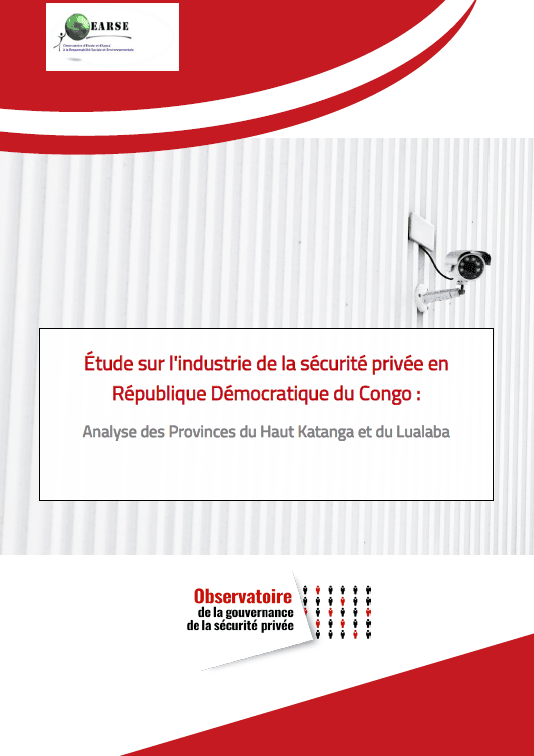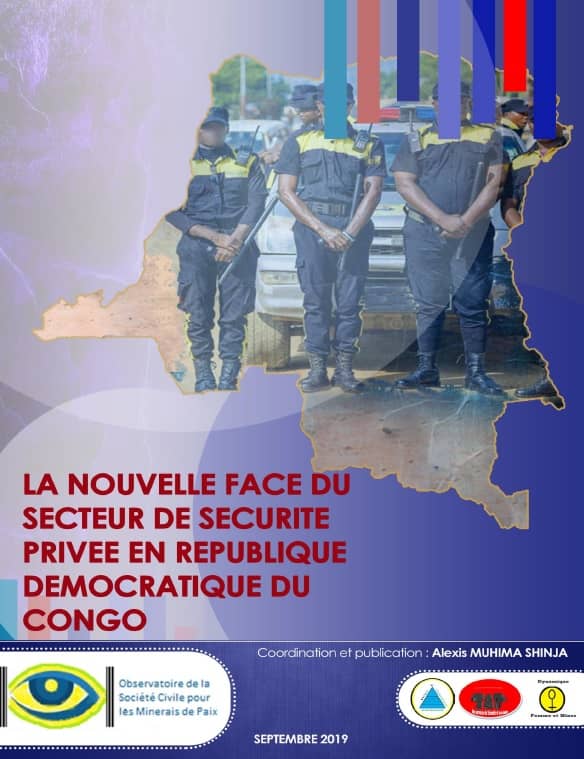Regulation and Oversight
Information about National Regulations and Regional and International Initiatives.
Democratic Republic of the Congo
Since the 1990's and the liberalisation of the mining sector in regions of the country, private security has experienced dramatic growth. The industrial mining sector has become an important market for the security industry, however reports reveal that this is a source of tension in some communities. There are more than 294 private security companies (PSCs) operating in the DRC and they are regulated by the Ministry of Inteior and Ministerial Order No. 25 of 27 June 2014.
Main law regulating private security: MINISTERIAL ORDER NO. 25/CAB/MININTERSECDAC/037/2014 OF 27 JUNE 2014 (FRENCH)
Key Information |
|
The Democratic Republic of the Congo is not a participant to the Montreux Document. |
|
Sector Size (2019)
|
Can PSC personnel carry firearms? No * Art. 10, Ministerial Order No. 25/CAB/MININTERSECDAC/037/2014 |
International Code of Conduct Association (ICoCA)
|
Voluntary Principles on Security and Human Rights
|
Summary
Since its independence in 1960, the DRC has had a chaotic history, marked by coups d'état, a dictatorship, interference by foreign powers and the looting of the country's considerable resources by Congolese and foreigners. In the east of the country, a multitude of militias and armed groups are fighting the forces of the DRC. Criminal activity by these groups include looting, attacks against civilians, rape, torture, recruitment of child soldiers, etc. Although the West is generally considered more stable, the rest of the country is also subject to a climate of insecurity and instability. Along with high rates of unemployment and social inequality, these security challenges are increasing the demand for private security services.
The private security sector in the DRC experienced a boom in 1990’s, coinciding with the liberalization of the mining sector in Lualaba and Upper Katanga. The industrial mining sector, therefore, has become an important market for the security industry. However, some communities affected by extractive activities perceive private security companies (PSCs) as a factor of tension.
To date, there is no national register in the public domain that can provide information on the numbers of PSCs in the DRC, their origins and ownership and/or the numbers of employees and their specialist sectors. Nevertheless, the Ministry of the Interior reports that the DRC has more than 294 PSCs throughout the country.
Legal Framework
Ministerial Order No. 25/CAB/MININTERSECDAC/037/2014 of 27 June 2014 amending and supplementing Ministerial Order No. 98/008 on the operating conditions of security companies is the main legal text that regulates the operation of security companies in DRC. This decree specifies the activities prohibited to PSCs, such as the carrying of firearms, lays out personnel training requirements, and charges the Civil Protection Directorate and the Commission Responsible for Monitoring and Regulating Private Security (hereafter the Control Commission), under the authority of the Ministry of Interior, with issuing operating permits, recruitment of foreign personnel, and training curriculum.
Challenges
Various challenges facing the private security sector in the DRC were identified in the baseline study, Étude sur l’industrie de la sécurité privée en République Démocratique du Congo (see below). A brief discussion of several of these issues follows:
Regulatory Authority
Current legal framework does not place enough emphasis on the supervision of PSC activities. A large portion of the PSCs in DRC operate without permits and do not pay their annual fees. As mentioned above, a registry of private security companies or personnel does not exist, creating a large obstacle to monitoring and regulating the industry. In addition, inspections by the Control Commission are occasionally conducted but usually only in urban areas.
Training
Training is not standardized or affordable and often only occurs in Kinshasa, requiring PSC personnel to travel a long distance for the trainings. PSCs do not want to pay the high cost of transportation for their employees to attend trainings and often only provide as little as a few hours of briefing. In addition, it was reported that trainings do not include instruction on basic human rights and international law concepts.
Working conditions
PSC personnel have reported being subject working long hours above the legal maximum, being denied their minimum vacation days, and being paid beneath the minimum wage of the security sector. This is largely a result of the growing demand for security services creating a staffing shortage in the industry.
Misconduct
A link exists between some PSC employees and organised theft. Guards collaborate with criminal organisations by either actively participating or passively allowing theft to happen. As a result, guards on duty during a theft are often dismissed without a proper inquiry into the incident in order to protect the reputation of the company.
Members of the Private Security Governance Observatory
- Action contre l'Impunité pour les Droits Humains (ACIDH)
- Action des Chretiens Activistes des Droits de l'Homme Ashabundad (ACADHOSHA)
- Action Paysanne Contre la Faim (APCF)
- l'asbl Volontaires Du Monde
- Justice Pour Tous
- Cadre de concertation pour la Reforme des Services de Sécurité et de la Justice (CCRSSJ)
- Conseil Régional des Organisations Non Gouvernementales de Développement (CRONGD)
- Dynamique des Femmes dans les Mines /Tshopo
- Fondation Solidarité des Hommes (FSH)
- Justicia Asbl
- Maison de Gouvernance du secteur Extractif / MGSE
- Maison des Mines du Kivu (MMKi)
- Observatoire de la Société Civile Congolaise pour les Minerais de Paix (OSCMP)
- Observatoire d’Etudes et d’Appui à la Responsabilité sociale et environnementale (OEARSE)
- Rencontre pour la Paix et les Droits de l’Homme (RPDH)
- Solidarités
Étude sur l’industrie de la sécurité privée en République Démocratique du Congo :Analyse des Provinces du Haut Katanga et du Lualaba |
La nouvelle face du secteur de sécurité privée en République Démocratique du Congo |
|
Download PDF Here |
Download PDF Here |



